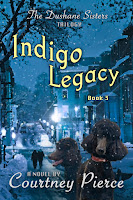By Robin Weaver
A long time before Mad-Cow-Disease was a common term,
there was a mad cow. Her name was Bitsie and the huge Guernsey hated me.

Enduring the endless feudal system known as farm
life was dreary enough for a ten-year-old, but Bitsie asserted her strange moo-joe
to make life even more hellish. Whenever I entered her domain (which was daily
since I had to feed the bitch), she’d charge, full throttle, forcing me under a
fence or up the nearest scrub pine. She’d wait at the bottom of the tree,
daring me to come down as she idly chewed her cud.
Bitsie would conveniently depart just before my
parents came home, thus forcing me to face the juvenile version of a firing
squad—a.k.a. my mother—with no evidence. My attempts to explain the reason for
unfinished chores fell on deaf ears. No one believed Bitsie actually harassed
me, thus I become the “story teller” and the term “cowgirl” was applied in a
less than flattering way.

“But I never lie,”
I protested. And I didn’t.
Now because I was
a paragon of virtue, but because when I was three-years-old, my grandmother
told me, “If you fib one more time, the devil will come out of the ground and
get you with his pitchfork.” That kind of thing stays with a person.
Ironically, Bitsie
had no beef with anyone except me. Around other people, she personified the
perfect cow, gentle and unassuming, as she switched her long tail at the flies
circling her brown and white hide.
Things changed the
minute we were alone. The Bovine charged with demonic energy, forcing my short
legs into a long sprint to avoid her devilish hooves.
One day, everything changed. I’d been ordered to
clear the brush in the lower field—a task I actually liked; the brush wasn’t
heavy so while I piled it, I could daydream about fairy princesses and drinking
milk from a store-bought carton. The catch-22: I had to venture into Bitsie’s
domain, the dreaded pasture.
When I approached the gate, Bitsie came running. I
froze. What a choice—get in trouble or get trampled?
Suddenly, the voice of doom sounded. “Get down there
and clear that brush. Now!” Mom’s command was followed by the more dreaded,
“Don’t make me come out there.”
She’d walked to the edge of the yard and had a clear
view of the gate. I knew from experience, Bitsie wouldn’t attack with an
audience, so I seized the opportunity to avoid both menaces and ran as fast as
I could.
I hadn’t covered much ground (short legs, remember?)
when I heard the door screen slam.
Uh-oh. Out of time.
I looked over
my shoulder and horror of horrors, Bitsie charged. With no tree in sight. I’m not
Catholic but I made the sign of the cross.
Just when the thunder threatened to reduce me to
manure. Whack!
I kept running, finally reaching a tree and shimming
up the trunk. I didn’t look until I’d planted both feet on the second branch,
about eight feet above the ground. I couldn’t imagine what magic had saved me.
My grandfather, armed with a two-by-four, circled
around the grand dame of milk. Bitsie shook her head and stomped her front hooves.
Gramps held firm, forcing the devil-cow into submission, as much with his will
as with the big stick he so softly carried. I watched with a strange
combination of fear and wonder. The beast-of-horror turned from my
grandfather’s stare and trotted away.
Gramps had always been my favorite person. Now he loomed
larger than livestock. Still, I didn’t come down from my lofty perch until Bitsie
was far, far away. Gramps took my hand and together we walked back to confront
my second demon—mother.
My grandfather had been helping mom with some
repairs in the barn. He’d said he knew I wouldn’t lie, so he’d stayed out of
sight to see what Bitsie would do.
At that young age, I learned one of life’s greatest
lessons. When someone believes in you, neither demons nor mad cows can touch you.

Robin Weaver
Author of:
BLUE RIDGE FEAR
ARTIFACT OF DEATH
THE SECRET LANGUAGE OF LEAH SINCLAIR





















